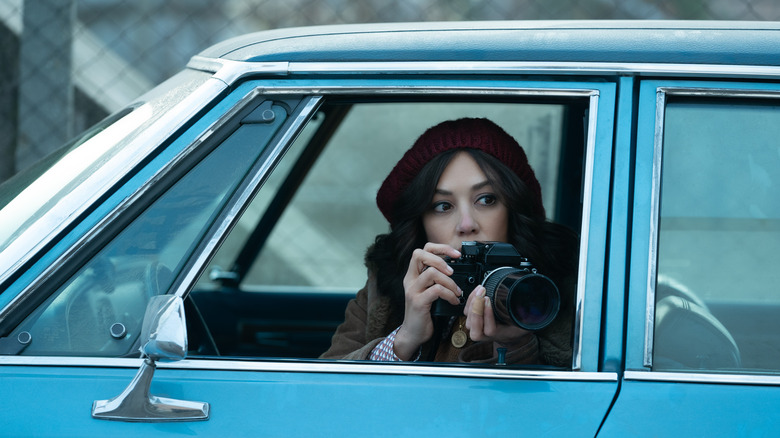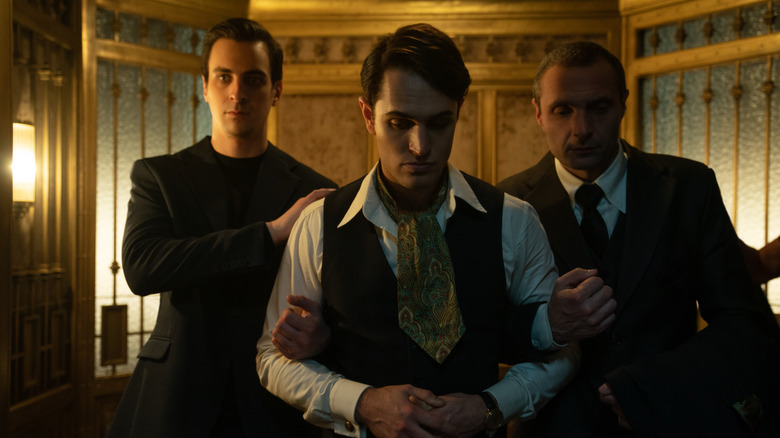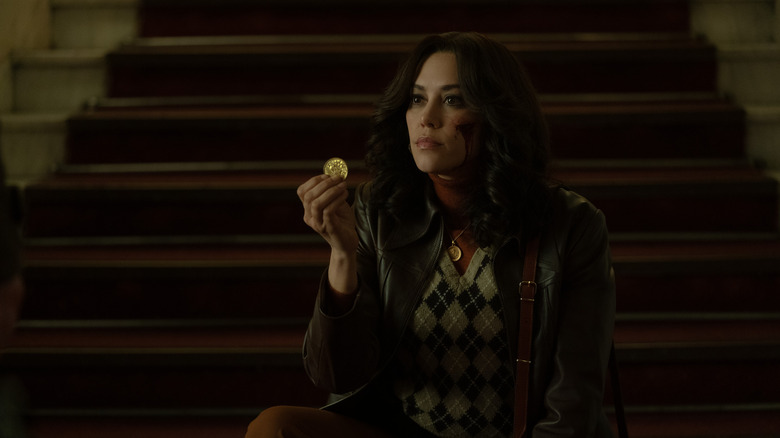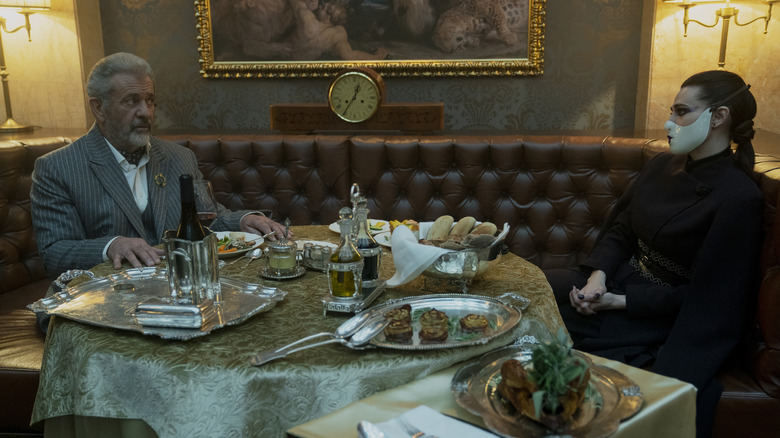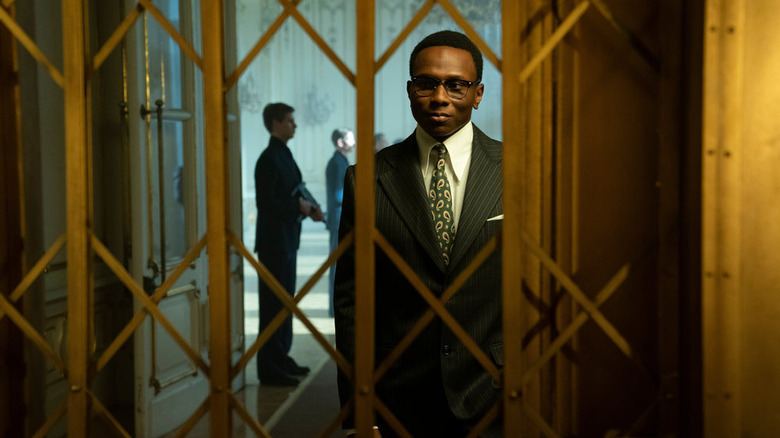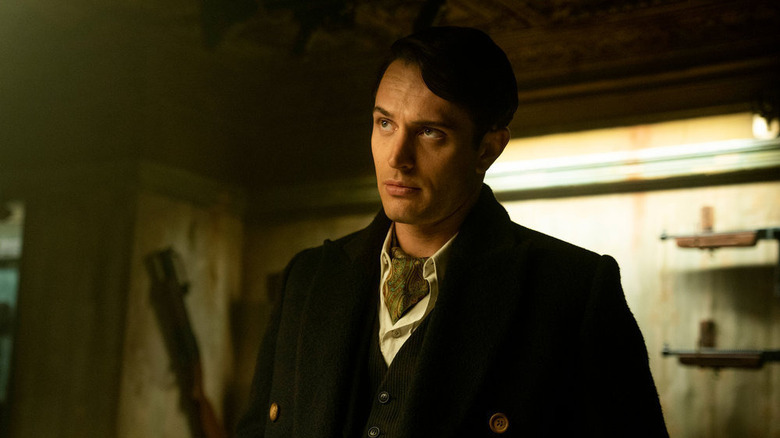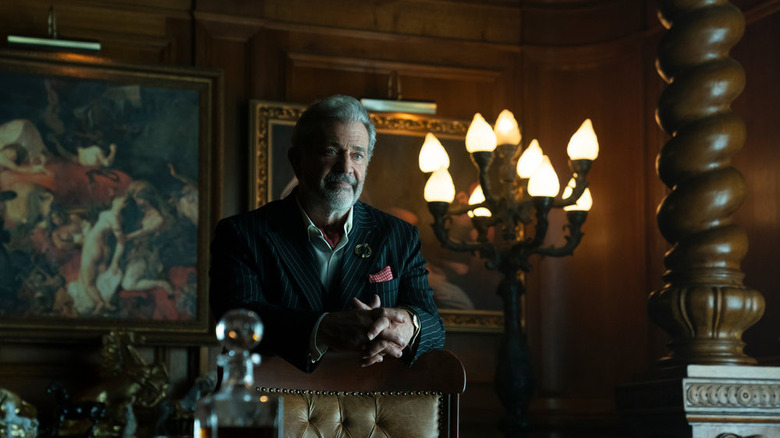How The Continental Expands The World Of John Wick
This article contains spoilers for the premiere episode of "The Continental."
Even a casual viewer of the "John Wick" films can't help but be intrigued by the franchise's assassin-filled world. One of the unique pleasures of the original 2014 movie is the way it begins in a very grounded, incredibly recognizable reality, sliding bit by bit into a wilder, more garish, more violent, more intriguing underworld along with John (played in the films by Keanu Reeves), as he delves back into the life of murder he thought he'd left behind.
The very first spinoff/expanded universe/prequel to come from the "John Wick" films is the Peacock original miniseries "The Continental: From the World of John Wick," and it finds itself in territory that's both untouched and well-established. Each subsequent "John Wick" film (from Chapters 2 through 4) has developed the world of "Wick" on a grand, global scale, taking John to locales all around the world. The films also delved deeper into John's home turf of New York and that city's own Continental hotel, run by the dashing and mysterious Winston (played in the films by Ian McShane).
"The Continental" is a series born out of one of Winston's lines from the first "John Wick," where he observes that he's been running the hotel (on behalf of the enigmatic High Table crime organization) for the past 40 years. Showrunners Greg Coolidge, Kirk Ward, and Shawn Simmons have built the series around a young Winston (Colin Woodell) as he makes his way toward taking over the titular hotel of assassins. In doing so, "The Continental" further expands the world of "John Wick," clarifying a few unanswered questions while raising new ones and also making fairly wild additions to the series' lore.
Don't talk about Continental club
The difference between the aforementioned real world and the heightened underworld of the "John Wick" films is something "The Continental" couldn't really avoid dealing with during its three 90-minute long episodes. One gets the sense while watching the "Wick" films that the real world we know exists, blissfully unaware, while the assassins and criminals play out their never-ending game of "If You Give a Mouse a Cookie" in the margins, hidden in the shadows and corners us normal folk never look at too closely.
"The Continental" more or less continues this notion of a sort of silent detente between the "normal" world and the underworld. In fact, it doubles down on the normal world being recognizable: set sometime during the late 1970s, it's made clear that the Vietnam War occurred recently, that pop music is exactly what it was then (complete with characters making references to David Bowie while others dance the night away to real-life disco hits), and that historical events in general still exist, such as the NYC sanitation workers' strike that began in 1968.
While average citizens have about as much to do with the High Table as you or I do with organized crime, the law enforcement workers of "The Continental" have varying degrees of knowledge regarding the hotel and its denizens. This is shown through the storyline of NYPD Detective KD (Mishel Prada) and her partner (and sometime lover) Mayhew (Jeremy Bobb). As KD tracks Winston and his brother, Frankie (Ben Robson) to the Continental, Mayhew cryptically warns her not to investigate. He doesn't say much more than that, and it's not clear whether he doesn't want to, or if he actually can't.
'Disco Noir'
In the series' official press notes, director Albert Hughes (who helms Nights 1 & 3) explains one of the show's core aesthetic goals: "Early on in our process we wrote the words 'Disco Noir' on the wall. It was emblematic of the experience we wanted to create."
With those two words in mind, not only does the series itself come into better focus, but so do the reasons for why the Continental is portrayed as it is here. Right from Night 1's opening fight sequence, which takes place on New Year's Eve, it's clear that this Continental is run far differently than the one we've come to know under an older Winston's tenure. Of course, that's because someone else is running the place: the lifelong crime lord Cormac (Mel Gibson), who seems like he comes straight out of a Martin Scorsese or Brian De Palma gangster film.
Despite Cormac's grandioseness, he's totally in step with the 1970s when it comes to debauchery. His Continental seemingly takes a lax attitude toward sex, especially sex in public, as Frankie is seen passing more than a few amorous couples (maybe even a throuple) in flagrante delicto, making the NYE party scene highly akin to the one seen in Damien Chazelle's recent "Babylon."
While the drug-fueled party scene is well represented within the Continental, making it a sort of competitor of the infamous Studio 54 of that era, the "Noir" part of "Disco Noir" is shown via the competing criminal organizations claiming ownership over other parts of NYC, especially the one led by the Orphan Master (Dan Li), which seems to be its own gang, one that doesn't necessarily pledge itself to the High Table.
Adjudication nation
One of the best additions to the mythology of "John Wick" appeared in "Chapter 3 — Parabellum": the Adjudicator, played in that film by Asia Kate Dillon. In "Parabellum," the Adjudicator acted as the High Table's version of an internal police force, someone who had the authority to reprimand members of the Table who've broken or bent the rules to the Table's dissatisfaction.
It's reasonably assumed that there's only one Adjudicator per era, and the position is probably a lifetime appointment; though, in the world of "John Wick," a lifetime may not be all that long. In any case, there's a different Adjudicator working for the High Table in "The Continental" (played by Katie McGrath), and right from her introductory scene, it's clear that this is a different type of character than Dillon's was (or, er, will be, in prequel parlance).
This Adjudicator is someone who's been through some violent stuff, wearing a garish 1930s-era Hungarian face mask painted with a drawing of lips on it, implying that an unseemly scar lies beneath: was this Adjudicator an assassin herself at one time? Or perhaps a member of the Table didn't like one of her rulings in the past?
Perhaps because of this wound, this Adjudicator comes complete with her own bodyguard, a kilt-wearing henchman who acts as the muscle to the Adjudicator's mouth, torturing and tenderizing her prey.
Origin stories
Being a prequel series, "The Continental" of course expands upon and adds to the backgrounds of characters already established in the "John Wick" films. First and foremost is Winston, who is not only revealed to have a ne'er do well Vietnam vet brother, but to have a history with Cormac, with the two brothers having been small-time accomplices of the crime lord in their youth. He also is revealed to be a sharp con artist of sorts, convincing others to do what he wants in very charming, suave fashion, which very much includes womanizing, as seen when he beds Mrs. Davenport (Claire Cooper) in Night 1.
While the series establishes a few quirky new characters of its own (such as the deadly and silent assassin twins known as Hansel and Gretel, played by Mark Musashi and Marina Mazepa), the show also delves into a few other colorful supporting characters from the films as it continues, including the Continental's gentlemanly concierge, Charon (Lance Reddick in the films; Ayomide Adegun in the series), who is shown to be Cormac's right-hand man as the show begins.
Cryptic currency
In "Chapter 3 — Parabellum," we seemed to learn the origin of where all those gold coins and Markers that act as the currency of the High Table were made: at a facility in Morocco, run by a man named Berrada (Jerome Flynn). However, at the beginning of Night 1 of "The Continental," Frankie puts into action a plan to steal a highly valuable piece of machinery from the hotel's vault: a coin press. Once taken, the entire series is set in motion, and Cormac goes nuts trying to find a way to reacquire the press, going so far as to kidnap Winston all the way from London to help track down Frankie.
Given what Berrada said about the coin-making machinery in "Parabellum," it seems like that facility already exists when "The Continental" takes place. Could it be, then, that the High Table used to distribute smaller coin presses like the one Frankie steals to each Continental around the world as a way of cutting down demand on the Moroccan machine? Is it possible that this incident is what convinces the Table to stop giving each Continental a press? Or is the NYC location special in this regard? Perhaps we'll have some answers soon enough.
Business is where you find it
One thing that is clearly non-negotiable in the Continental is its rigid rule that no business (i.e. killing) may take place on the hotel's grounds. This 1970s version of the hotel even has a helpful visual cue, a system where any violence within the hotel can only occur when a red light is turned on.
However, rules are made to be broken, and in this instance, it's Cormac himself who keeps finding creative workarounds to murder while still in his hotel. In Night 1, he essentially convinces an underling to commit suicide rather than execute them himself, and, later in the series, it's Cormac's hot temper that sees him break the rule more openly. This isn't merely a by-product of his anger management issues, either, as there's an implication that Cormac was a run-of-the-mill NYC gangster before gaining control of the Continental — and, with that appointment, he begrudgingly found himself having to conform to the High Table's management. In this way, it begins to make sense why the older Winston in the "Wick" films is similarly fluid when it comes to his opinions toward the Table and its rules, especially where "his" hotel is concerned.
While all of these expansions and complications to the world of "John Wick" can be seen in the early episodes of the series, the final episode of "The Continental" introduces some wacky new elements to the hotel that even the Table doesn't see coming, and who knows what the cinematic spinoff film "Ballerina," starring Ana De Armas, has in store for the mythology. All we can say for sure is that, when it comes to "John Wick" and "The Continental," one opened door leads to many more new rooms.
"The Continental" premiered on September 22 on Peacock.
